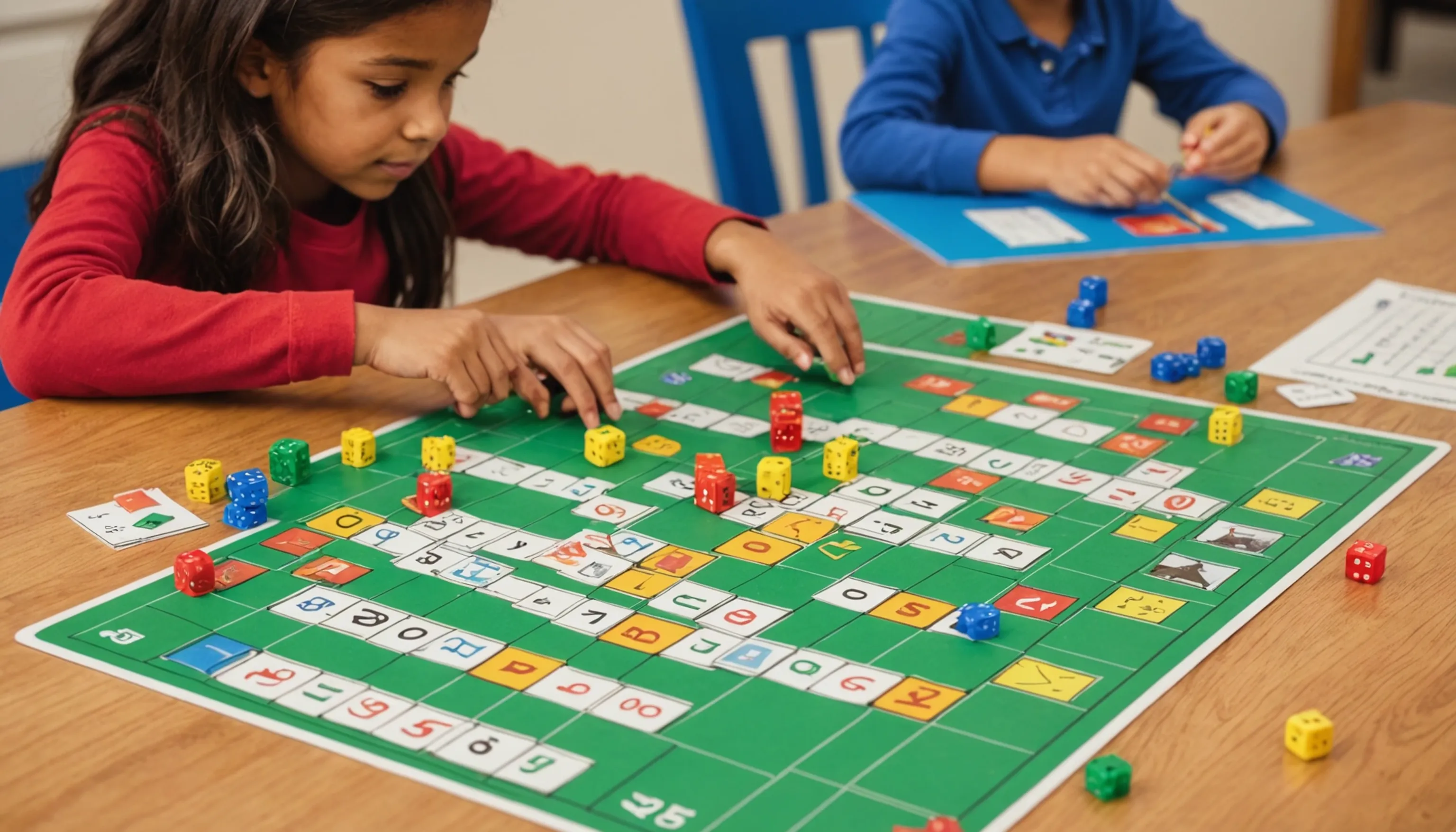Fun Math Games for Students of All Ages
 HvWHenry van Wagenberg
HvWHenry van Wagenberg
Fun Math Games for Students of All Ages
Math doesn’t have to be boring! Fun math games for students of all ages can transform learning into an enjoyable experience. These games help students develop critical thinking and problem-solving skills while reinforcing essential math concepts. Whether in the classroom or at home, there are countless options to engage learners.
From interactive online platforms to traditional board games, math games cater to various learning styles. Incorporating games into math education not only boosts confidence but also fosters a love for the subject. So, let’s explore some exciting math games that make learning fun!
Why Math Games Are Important for Learning
Math games play a crucial role in the educational development of students. They not only make the subject enjoyable but also enhance learning in various ways. Here are some reasons why math games are important for learning:
- Engagement: Games capture students' attention and motivate them to participate actively. When students are engaged, they are more likely to absorb and retain information.
- Skill Development: Math games help build essential skills such as critical thinking, problem-solving, and logical reasoning. These skills are vital not just in math but in everyday life.
- Social Interaction: Many math games encourage collaboration and teamwork. Students learn to communicate, share strategies, and work together to solve problems, fostering social skills.
- Instant Feedback: Games often provide immediate feedback, allowing students to understand their mistakes and learn from them right away. This instant reinforcement helps solidify concepts.
- Diverse Learning Styles: Math games cater to various learning styles, whether visual, auditory, or kinesthetic. They provide different methods for students to grasp mathematical concepts.
- Confidence Building: Successfully completing a game boosts students' confidence. This newfound confidence can translate into improved performance in math class.
Incorporating math games into learning not only enhances understanding but also creates a positive attitude towards mathematics. Students who enjoy math are more likely to pursue it further in their academic careers.
Top Math Games for Teenagers
Engaging teenagers in math can be challenging, but the right games can make a significant difference. Here are some of the top math games that are perfect for teenagers:
- Prodigy Math: This online game combines math practice with an adventure-based format, making learning fun and interactive.
- Math Jeopardy: A classic game show format that encourages team competition while reinforcing math concepts.
- 24 Game: Players use basic operations to reach the number 24 using four numbers, enhancing mental math skills.
- Math Bingo: A fun twist on traditional bingo, where players solve math problems to mark their cards.
- Kahoot!: This platform allows teachers to create interactive quizzes that can include math questions, making learning competitive and exciting.
These games not only make math enjoyable but also help teenagers develop essential skills that will benefit them in their academic journey.

Online Math Games
Online math games have revolutionized the way students learn and practice math skills. With the rise of technology, these games offer an engaging and interactive way for students to develop their mathematical abilities from the comfort of their own homes. Here are some of the top benefits of online math games:
- Accessibility: Students can access online math games anytime and anywhere, making it easy to practice at their own pace. This flexibility is especially beneficial for students who need additional help outside of classroom hours.
- Diverse Learning Resources: Online platforms often provide a variety of games that cater to different math topics and skill levels. From basic arithmetic to advanced algebra, there’s something for everyone.
- Interactive Learning: Many online math games incorporate elements of competition and rewards, motivating students to engage with the material and strive for improvement.
- Progress Tracking: Most online platforms offer analytics that allow students and teachers to track progress, identify strengths and weaknesses, and adjust learning strategies accordingly.
- Community and Collaboration: Some online math games allow students to collaborate or compete with peers, fostering a sense of community and teamwork.
Incorporating online math games into education not only enhances understanding but also cultivates a positive attitude towards math, making it a vital tool for modern learning.
Board Games That Make Math Fun
Board games are a fantastic way to make math fun and interactive, providing students with an engaging way to practice their skills while enjoying time with family or friends. Here are some board games that effectively incorporate math concepts:
- Sum Swamp: Ideal for younger students, this game helps kids practice addition and subtraction in a fun, swamp-themed adventure. Players navigate through the swamp while solving math problems to advance.
- Monopoly: A classic game that teaches players about money management, addition, and strategy. Players learn to calculate costs, handle transactions, and make decisions based on financial principles.
- Math Dice: This game challenges players to use math operations to reach target numbers using dice rolls. It’s a great way to develop mental math skills and quick thinking.
- Prime Climb: A colorful, mathematical board game that emphasizes prime numbers, multiplication, and strategic thinking as players navigate the board to reach the center.
- 24 Game: Players use a set of numbers and basic operations to create an equation that equals 24. This game boosts problem-solving skills and quick calculations.
These board games not only reinforce math skills but also promote critical thinking, collaboration, and friendly competition. Integrating board games into math education can create a positive learning environment and foster a love for the subject.
Math Card Games for Groups
Math card games are an excellent way to engage groups of students while reinforcing important math concepts. These games foster teamwork and healthy competition, making math practice enjoyable. Here are some fun math card games that work well in group settings:
- Math War: A classic game where two players flip cards simultaneously, and the player with the higher value wins the round. Variations can include adding or subtracting the numbers on the cards to make it more challenging.
- 24 Card Game: Players use four numbers on a card and basic operations to reach a total of 24. This game encourages critical thinking and quick calculations, making it perfect for groups.
- Fraction War: Similar to Math War, but players use fractions. This game helps students practice comparing and simplifying fractions in a fun and interactive way.
- Sum It Up: Each player draws a card and keeps it hidden. Players take turns guessing the total sum of all visible cards. This game helps develop addition skills and strategic thinking.
- Math Rummy: A twist on the classic Rummy game, where players form sets of numbers that fit specific math criteria, like multiples or factors. It reinforces number recognition and relationships.
These math card games encourage collaboration and communication among students, making learning math a social and enjoyable experience. Incorporating card games into the curriculum can help students develop a positive attitude towards math.

Math Games for Younger Students
Math games for younger students are essential for building foundational skills while keeping learning fun. These games can make concepts like addition, subtraction, and counting engaging. Some popular options include:
- Hopscotch Math: A physical game where students hop on numbers, solving problems as they land.
- Math Bingo: A classic bingo game that uses math problems for players to solve, promoting number recognition.
- Counting Bears: Colorful bear counters help students practice counting and basic addition.
These interactive games not only enhance math skills but also encourage social interaction and teamwork among young learners.
Interactive Math Apps
Interactive math apps have become a vital resource for students of all ages, providing engaging and effective ways to learn math concepts. These apps offer a variety of features that cater to different learning styles and skill levels, making math accessible and enjoyable. Here are some popular interactive math apps that students can benefit from:
- Khan Academy: This free app offers a comprehensive range of math topics, from basic arithmetic to advanced calculus. With instructional videos and practice exercises, students can learn at their own pace.
- Prodigy Math: This game-based learning platform combines math practice with an adventure game format. Students earn rewards and level up while solving math problems tailored to their skill levels.
- Mathway: An excellent tool for older students, Mathway allows users to input math problems and receive step-by-step solutions, helping them understand the processes involved.
- SplashLearn: Designed for younger students, this app offers interactive math games that cover essential skills like addition, subtraction, and more, all in a fun, colorful environment.
- IXL Math: IXL provides personalized math practice, adapting to each student's skill level and offering instant feedback on performance.
Interactive math apps not only enhance learning but also foster a positive attitude towards math. By integrating technology into their education, students can enjoy a more dynamic and personalized learning experience.
Outdoor Math Games
Outdoor math games offer a unique and engaging way for students to learn math concepts while enjoying the fresh air and physical activity. These games not only reinforce important skills but also promote teamwork and social interaction. Here are some exciting outdoor math games that students can enjoy:
- Math Scavenger Hunt: Create a scavenger hunt where students solve math problems to find the next clue. Each problem leads them to a new location, combining physical activity with critical thinking.
- Hopscotch Math: Draw a hopscotch grid with numbers and math symbols. As students hop, they must solve the math problems they land on, reinforcing addition, subtraction, and other skills.
- Measurement Relay: In teams, students race to measure different objects using rulers or measuring tapes. They must record their findings and calculate averages or totals, promoting teamwork and measurement skills.
- Jumping Jacks Math: Call out math problems, and students must perform a certain number of jumping jacks based on the answer. This physical activity helps reinforce math facts while providing exercise.
- Math Tag: In this variation of tag, the "it" player must answer a math question correctly before tagging another player. This keeps everyone engaged while practicing math skills.
By incorporating outdoor math games into the curriculum, teachers can create a fun and dynamic learning environment that encourages physical movement and reinforces mathematical concepts.
Creative Classroom Math Activities
Creative classroom math activities are essential for making learning engaging and enjoyable for students. These activities not only reinforce mathematical concepts but also encourage collaboration, critical thinking, and creativity. Here are some innovative classroom math activities that can enhance the learning experience:
- Math Art: Combine math with creativity by having students create geometric art. Using shapes and symmetry, students can create visually appealing designs while practicing their understanding of spatial relationships and measurements.
- Math Storytelling: Encourage students to create stories that incorporate math problems. For example, they can write a story about a character who needs to solve a series of math challenges to achieve a goal. This activity fosters creativity while making math relatable.
- Real-World Math Projects: Assign projects that require students to apply math concepts to real-life situations, such as budgeting for a class event or designing a dream home. This practical application reinforces the relevance of math in everyday life.
- Math Stations: Set up different math stations around the classroom, each focusing on a specific skill or concept. Students rotate between stations, engaging in hands-on activities and games that promote learning through exploration.
- Interactive Math Journals: Have students maintain math journals where they can reflect on their learning, solve problems, and illustrate concepts. This encourages deeper thinking and allows for personalized learning.
By incorporating these creative classroom math activities, teachers can create a dynamic learning environment that promotes enthusiasm and a love for math.
